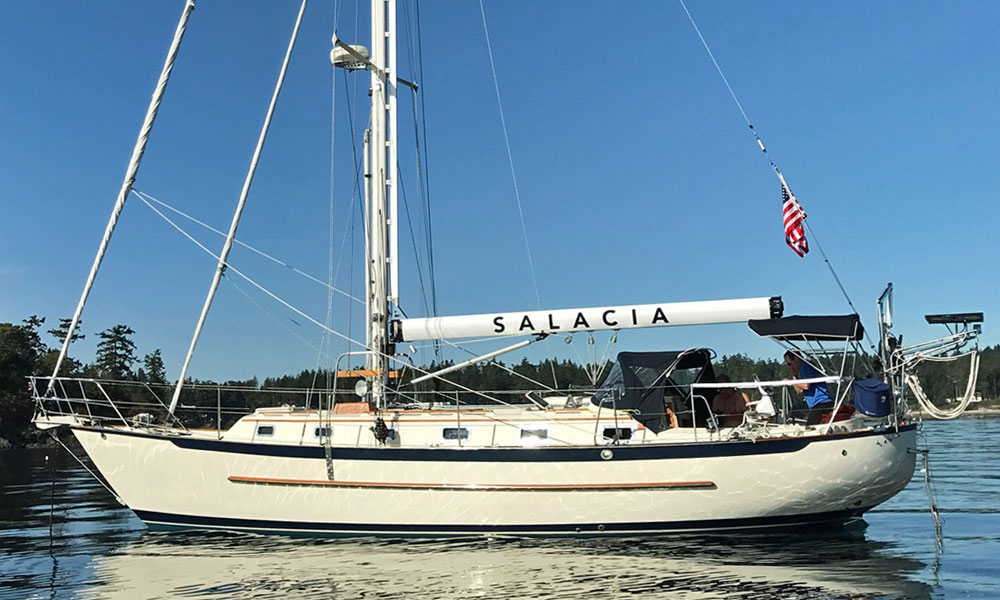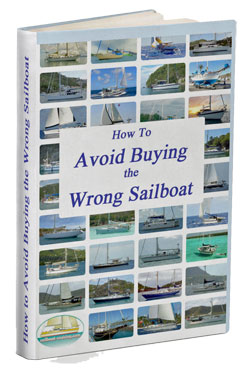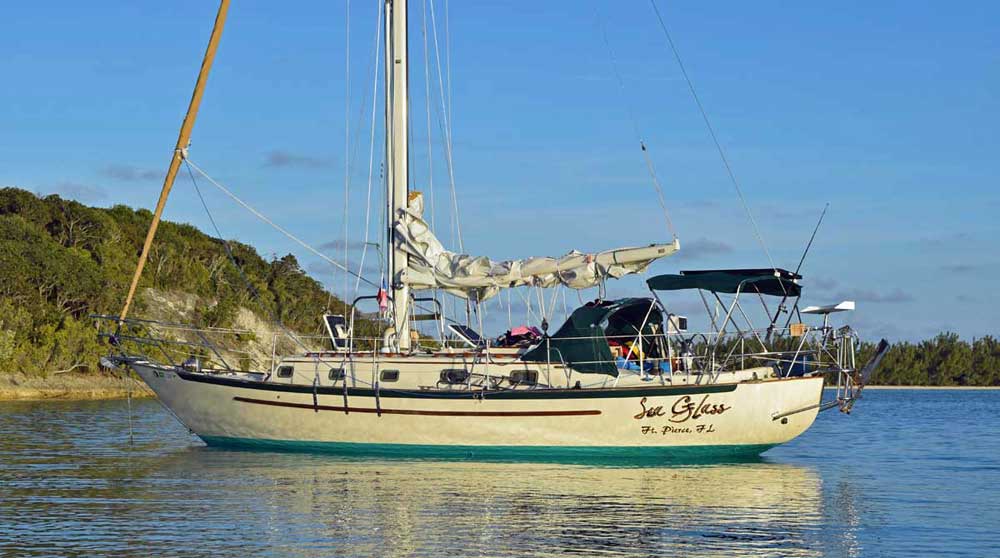- Home
- Cruising Yachts 40' to 45'
- Pacific Seacraft 40
The Pacific Seacraft 40 Sailboat
Specs & Key Performance Indicators
The Pacific Seacraft 40, a canoe-sterned heavy-displacement cutter, was designed by Bill Crealock and built in the USA by Conyplex Pacific Seacraft.
Published Specification for the Pacific Seacraft 40
Underwater Profile: Fin Keel & Skeg-hung Rudder
Hull Material: GRP
Length Overall: 42'2" (12.85 m)
Waterline Length: 31' 3" (9.53 m)
Beam: 12'5" (3.79 m)
Draft: 6' 1" (1.85 m)
Rig Type: Cutter
Displacement: 24,000 lb (10,886 kg)
Designer: Bill Crealock
Builder: Conyplex Pacific Seacraft (USA)
Year First Built: 1997
Published Design Ratios for the Pacific Seacraft 40
1. Sail Area/Displacement Ratio: 16.3
2. Ballast/Displacement Ratio: 35.8
3. Displacement/Length Ratio: 351
4. Comfort Ratio: 37.5
5. Capsize Screening Formula: 1.7
Summary Analysis of the Design Ratios for the Pacific Seacraft 40
1. A Sail Area/Displacement Ratio of 16.3 suggests that the Pacific Seacraft 40 will, in the right conditions, approach her maximum hull speed readily and satisfy the sailing performance expectations of most cruising sailors.
2. A Ballast/Displacement Ratio of 35.8 means that the Pacific Seacraft 40 will have a tendency to heel excessively in a gust, and she'll need to be reefed early to keep her sailing upright in a moderate breeze.
3. A Displacement/Length Ratio of 351, tells us the Pacific Seacraft 40 is in the ultra-heavy displacement category. Load her up as much as you like and her performance will be hardly affected, not that it was ever startling. Few if any sailboats are built to this displacement category these days - but they remain popular with some long-distance sailors.
4. Ted Brewer's Comfort Ratio of 37.5 suggests that crew comfort of a Pacific Seacraft 40 in a seaway is similar to what you would associate with the motion of a moderate bluewater cruising boat - a predictable and acceptable motion for most seasoned sailors.
5. The Capsize Screening Formula (CSF) of 1.7 tells us that a Pacific Seacraft 40 would be a safer choice of sailboat for an ocean passage than one with a CSF of more than 2.0.
Cruisers' Questions about this Sailboat...
What is the difference between the Pacific Seacraft 40 and the Crealock 40?
What is the difference between the Pacific Seacraft 40 and the Crealock 40?
The Pacific Seacraft 40 and the Crealock 40 are actually the same boat, just with different names.
The Pacific Seacraft 40 is the official name given by the manufacturer, Pacific Seacraft, while the Crealock 40 is the name used by some sailors and reviewers to honour the designer, William Crealock. The boat was introduced in 1997 as a modernized and bigger sister of the famous Crealock 37.
The Pacific Seacraft 40 is designed for long-distance voyaging and offshore cruising. It has a sensible and spacious interior layout that can accommodate up to six people comfortably. It has a U-shaped galley, a seagoing double quarter berth, a forward cabin with an island queen bed, and a large head with a separate shower stall. It has plenty of well-thought-out storage space for provisions, gear, and equipment. It also has good engine access and a large fuel capacity of 70 gallons.
The Pacific Seacraft 40 is not a speed demon, but it can log consistent 140-mile days and do so with very good sea comfort. The boat is well balanced and directional stability is good, making it easy to helm. It is also seaworthy, sea-kindly, and capable of handling heavy weather conditions.
The Pacific Seacraft 40 is a high-quality boat that is built to last and has a reputation for excellence. It is internationally recognized to be among the finest bluewater sailing yachts in the world.
How many people can sleep on board a Pacific Seacraft 40?
How many people can sleep on board a Pacific Seacraft 40?
The Pacific Seacraft 40 sailboat can sleep up to six people on board. It has a forward cabin with an island queen bed, a seagoing double quarter berth, and a convertible dinette that can turn into a double berth. The boat also has a large head with a separate shower stall and a U-shaped galley with a stove, oven, refrigerator, and sink. The interior is spacious and comfortable, with plenty of storage space and natural light.
What is the history of Pacific Seacraft?
What is the history of Pacific Seacraft?
Pacific Seacraft is an American shipyard based in North Carolina, Washington and founded in 1995. Pacific Seacraft primarily manufacture monohull sailing boats made of fiberglass. The shipyard is best known for its Crealock sailing boats which were designed by William Crealock.
The company was originally founded by Mike Howard and Henry Mohrschladt in 1975, with Mohrschladt as the first president. The first design produced was Mohrschladt's Pacific Seacraft 25, a trailerable sailboat that was reminiscent of a miniaturized version of the Scandinavian redningskoites of yore. The company was later purchased by Singmarine Industries, a subsidiary of the Singapore-based Keppel Group.
After Ericson filed for bankruptcy in 1990, Pacific Seacraft built some Ericson sailboat models. While headquartered in California, the company filed for Chapter 11 protection from its creditors in May 2007. The company's assets, with the exception of the Dana 24 molds which went to Portland, Oregon, were purchased at a bankruptcy auction September 2007 and moved in their entirety to Washington North Carolina, along with some of the former employees. Production restarted in 2008 under the new ownership of marine archeologist Stephen Brodie and his father Reid.
Pacific Seacraft currently produces four models: the Pacific Seacraft 31, 34, 37, and 40. All of them are cutter-rigged monohulls with canoe sterns, fin keels, and skeg-hung rudders. They have spacious and comfortable interiors that can accommodate up to six people. They are well balanced and seaworthy boats that can handle heavy weather conditions.
The above answers were drafted by sailboat-cruising.com using GPT-4 (OpenAI’s large-scale language-generation model) as a research assistant to develop source material; to the best of our knowledge, we believe them to be accurate.
Other sailboats in the Pacific Seacraft range include:
Recent Articles
-
Beneteau Oceanis 331 Clipper Review: Specs, Performance & Ratios
Feb 04, 26 07:25 PM
A comprehensive review of the Beneteau Oceanis 331 Clipper sailboat. We analyse design ratios, interior layout, and performance for prospective cruising owners. -
Self-Tacking Headsails: Track Systems vs Hoyt Jib Booms
Feb 03, 26 06:26 AM
Master the mechanics of self-tacking headsails. We compare traditional club-footed rigs, curved tracks, and the superior Hoyt Jib Boom for offshore sailing. -
Catalina 42 mk1 Review: Specs, Performance & Cruising Analysis
Feb 01, 26 06:35 AM
An in-depth review of the Catalina 42 mk1 sailboat. Explore technical specifications, design ratios, and practical cruising characteristics for this iconic cruiser.


